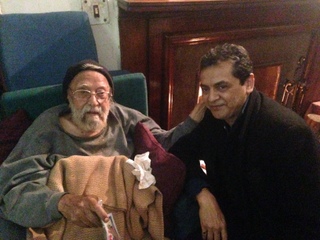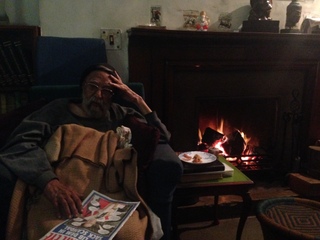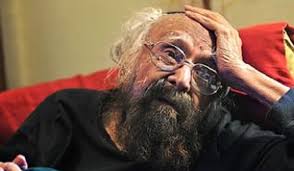
“Here lies one who spared neither man nor God
Waste not your tears on him, he was a sod
Writing nasty things he regarded as great fun
Thank the Lord he is dead, this son of a gun.”
–Khushwant Singh’s epitaph to himself
New Delhi, March 20: To the handful few who he allowed around him during his last years, urging their cherished one to a century of years had become a collective manifesto. It cannot be said for certain Khushwant Singh, who departed in the silence of a missed breath at home in Sujan Singh Park this afternoon, shared the zest of his constituency any longer. The first and only time I ever met him, shortly after he turned 99 this February, he intoned to me in whispers his diminishing lust for life. “Oh I so dislike no longer being my own master, I so dislike my dependence on other people. Even to go to the loo I must wait to catch someone’s eye and they have to help me…it’s the thing I have begun to most dislike, it’s my health I’ve most begun to miss, that I am no longer my own master…”
Reeta Dev Burman, neighbour and frequent care-giver to Khushwant Singh, sat opposite, having just fetched him the latest edition of “Private Eye”, his favourite magazine. She waved her arms about, as if to banish that despondency of tone. “But how could you even say that, Sir, you are the master of all of us, it is we who are dependent on you!”
Singh, lapsed in his sofa seat by the fireside, just looked at her with a wan here’s-looking-at-you-kid smile. Then he raised his glass, as if toasting the incredulity of Dev Burman’s exhort, and sniffed a sip. He was seldom known to have indulged himself to more than a peg a night, but that peg of single malt he missed for nothing. He never needed to say that evening how much he still loved his daily drink, but he spoke eloquently, though feebly, of how little he had begun to enjoy living. “I’ve already lived a rich and full life, you see, how much longer can one expect to go on…” For a man who had played the quirk of writing an obituary notice on himself aged 20, he had come a fair distance. He smiled infirmly, a little disagreeably, at the mention of going on to a hundred. His eye flickered, but only as if to say, look at the state of me.

He took another sip of whiskey, dropped wrinkled lids on his eyes and chanted the Gayatri mantra as clearly and beatifically as I have ever heard it spoken. His eyes still shut, he then said, plaintively, “The only other prayer I say to myself each morning is Om Arogyam, Om Shanti, a prayer for health and a prayer for peace.”
The room was dimly lit, like a cavernous shrine; the fire gave off the most light and it picked out books everywhere, ordered and wantonly piled, in shelves, on the floor, on the centre table where bottles of whiskey stood competing with volumes of words. The shrine’s deity sat closest to the fire. He wore a loose cap over his sparse, straggly hair and had a blanket thrown across his knees. It was a cold evening. On his chest he wore a stain of gravy as big as his heart. Khushwant Singh seldom bothered pretending what he was not. He was now an old man; when he ate, he often spilt food onto himself, and he was beyond caring about it.
He had chanced upon a piece The Telegraph had run on his feisty toast to turning 99 (In centennial corner, Indian spring With malice towards none of the other 99-ers) and a few days later he’d had word sent to me. He had recovered from the exertions of celebrations around him, he was asking if I would like to drop by for a drink. Dev Burman would be my guide into Sujan Singh Park’s most vaunted precincts. There was a sign by the doorbell to the ground-level flat that said: “Do not ring the bell unless you are expected.” I rang.
A hushed usher and a turn in the hallway later I was in the company of the man I had known by so many descriptions I was a little taken aback to see that he fit, rather shriveled, in one corner of a sofa seat. Khushwant Singh, Inner Temple barrister, diplomat, historian, novelist, editor, columnist, scion of the builders of imperial New Delhi, imp, scamp, jokester, famed raconteur of Bacchic ribaldry, much of which was myth he invented around himself. And yet all of that barely completes the description of the man who wrote the most words a Sardar ever did, bar the possibility that Manmohan Singh has been writing his life and times from Gah to goodbye and all that. Khushwant Singh collaborated notoriously with the Indira-Sanjay imposition of Emergency, earned the Padma Bhushan only to spurn it when Mrs Gandhi ordered the army into the Golden Temple in 1984 and rendered Sikhism’s holiest sanctum a bloodied battleground. A quarter century later, he would accept the Padma Vibhushan, the land’s second highest civilian honour, from a successor Congress government.
But if he took deep offence to Operation Bluestar, he turned with no less anger at the demolition of the Babri Masjid in 1992 and the communal riptide that tore across many parts in its wake. One of the things that he recalled to me that first and last evening with him was his sense of outrage with the causes and consequences of the tearing down of the Babri Masjid. His wrath had probably been touched off anew by the insistent arrival of L.K. Advani to the private fete at Sujan Singh Park the day he turned the final lap to a hundred. “That man has blood on his hands,” Singh told me with a sense of disdain undiminished after all these years, “And I told him as much, and very openly. I was to be chief guest at an event and Advani was there as deputy prime minister. When my turn came to speak, I said it out loud, his hands are dipped in blood. He heard me out, and told me he would give the answer to that another day…” Advani had arrived at his birthday party and left; circa February 11, 2014, the day of our assignation, Singh still awaited his promised reply. I begged one question of him before the clock ticked over half seven in the evening, time for Singh to prepare for dinner and retire. I asked what he thought of the state of the nation, having spanned all its years since Independence and before, and he threw me a quizzical glance and asked, “But I didn’t get what you said.” He probably did not want to answer that one, but I repeated the question. “Ah,” he said, rearranging his blanket, “It’s one catastrophe after another, catastrophe after catastrophe after catastrophe, but I’ve got used to it.”
He didn’t have long to bear with it. He went just as he had wished. “All that I hope for is that when death comes to me, it comes swiftly,” Singh wrote in his last book, ‘Absolute Khushwant: The Low Down on Life, Death & Most Things In-Between (Penguin, 2010)’, “without much pain, like fading away in sound slumber.” A fair guess is the note he’d most have preferred to attend his last journey is a crescendo of “Cheers!”, apt salute to the son of a gun. Now gone. RIP Khushwant Singh.

